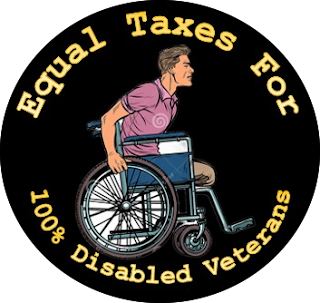 Colorado statue on disabled veteran property tax
relief: §§ 39-3-202(2) and (3) and 203(1.5) to (5), C.R.S:
Colorado statue on disabled veteran property tax
relief: §§ 39-3-202(2) and (3) and 203(1.5) to (5), C.R.S:
"rated by the federal department of veterans affairs as one hundred
percent permanent disability through disability retirement benefits or a
pension pursuant to a law or regulation administered by the department, the
department of homeland security, or the department of the army, navy, or air
force."
Issues.
(1) Required to follow the 2007 legislation, Colorado Department of Veterans Affairs excludes recognition of US military disability retirements, despite provision in the constitution and blocks such veterans from the disabled
veteran property tax exemption.
 (2) Missing from the Constitution but added
somehow by CODVA as their own disqualifier are veterans with “unemployability” VA
ratings. US Department of Veterans Affairs ratings for permanent and total disability
with unemployability (TDIU) are unacceptable to CODVA, blocking many qualified veterans, and their survivors, from any disabled veteran property tax exemption.
(2) Missing from the Constitution but added
somehow by CODVA as their own disqualifier are veterans with “unemployability” VA
ratings. US Department of Veterans Affairs ratings for permanent and total disability
with unemployability (TDIU) are unacceptable to CODVA, blocking many qualified veterans, and their survivors, from any disabled veteran property tax exemption.
Generally,
veterans who receive 100% VA disability compensation pension benefits are free to
work and are not limited in the amount of earnings they may receive, even when
their single- or combined-impairment ratings total 100%. For example, office or
sedentary workers such as clerks, lawyers, telephone workers and others may be
totally disabled from military line of duty illness or injury yet fully able to
continue gainful and satisfying employment although rated 100% disabled by VA
for loss of use of legs.
Not so a TDIU disabled vet, professionally judged by VA, Social Security or state
rehabilitation agency. That veteran’s service-connected disabilities are sufficient, without regard to other factors, and so
severe as to prevent performing the mental and/or physical tasks required to
get or keep substantially gainful employment. TDIU recognizes only permanent
and totally disabling service-connected issues via an extra-schedular
construct. A TDIU veteran is even barred by VA from employment rehab services
because no employment is deemed possible.
Permanent and total disability individual unemployability (TDIU) is a
recognition that service connected disabilities, while not rated individually
at 100%, are complete enough in their totality to equal 100% and to prohibit
employment and are in total, permanent and completely disabling. Diseases and injuries of
long standing that are actually totally incapacitating will be regarded as
permanently and totally disabling when the probability of permanent improvement
under treatment is remote.
Permanence of total disability is taken to exist when such
impairment is reasonably certain to continue throughout the life of the
disabled person. Total disability is considered to exist when there is present
any impairment of mind or body that is sufficient to render it impossible for
the average person to follow a substantially gainful occupation.
Generally, a vet qualifying for TDIU would also meet SSI
requirements for disability benefits, but the same is not true regarding SSDI
recipients and TDIU because TDIU is awarded only for military line of duty issues that cause complete and permanent disability.
The military services infrequently award such total disability retirements for
service members whose injuries or illnesses are completely disabling and
considered to be unimproved for life, but all military disability ratings, even for combat,
are not accepted by CODVA which recognizes only the US Department of Veterans
Affairs decisions, but then, not including VA’s permanent and total
service-connected unemployability disability awards. The means by which CODVA excludes military disability retirements is not known, even though its
provision is clearly constitutional and blocking these veterans is clearly unconstitutional!
Generally speaking, disregard for military disability ratings
and VA TDIU ratings seems unique among states providing property tax relief.
For instance, Virginia’s statutes:
A veteran
is considered to have a 100 percent service-connected disability if:
• The veteran's disability is rated at 100%; or
• The veteran's service-connection is rated at less than 100%, but the
veteran is paid at the 100% disability rate due to unemployability.
NOTE: Under either standard, the disability
must be considered total and permanent. Veterans with temporary disabilities do not qualify.






